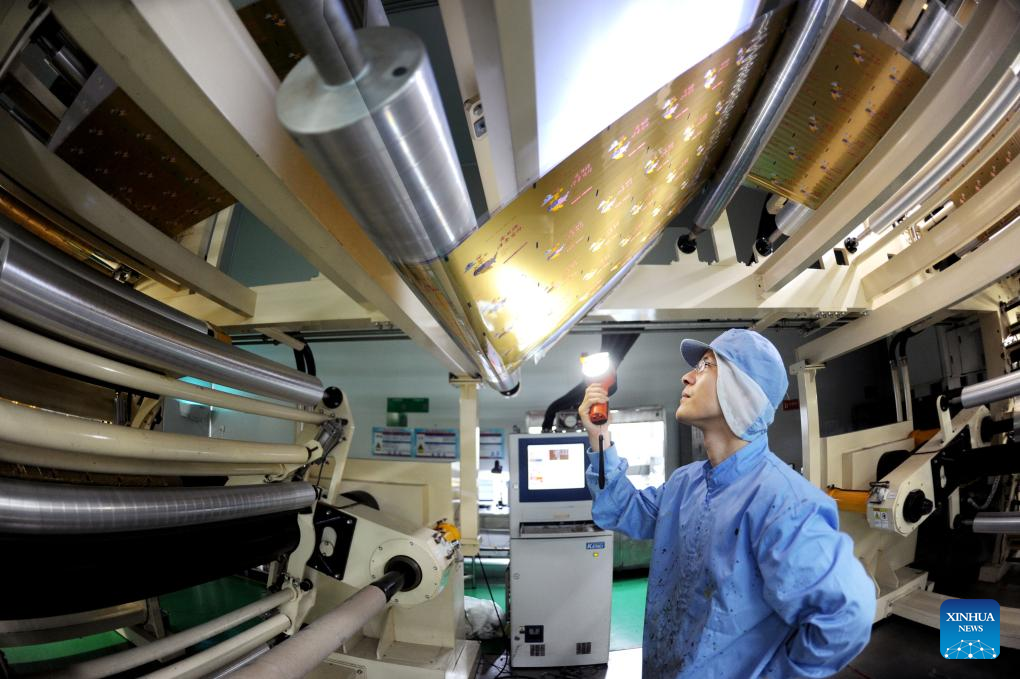
 0 Comment(s)
0 Comment(s) Print
Print E-mail Xinhua, December 17, 2024
E-mail Xinhua, December 17, 2024

An employee works on a production line of a pharmaceutical packaging manufacturer in Lianyungang City, east China's Jiangsu Province, Dec. 16, 2024. [Photo/Xinhua]
China's economic recovery gained momentum in November, fueled by a series of recent pro-growth policies that have contributed to an accumulation of positive factors.
In November, the impact of combined policy measures continued to unfold, yielding excellent results in key economic indicators such as industrial output, investment, consumption and services for the past month, said the National Bureau of Statistics (NBS).
"Boosted by a raft of policy measures, the Chinese economy has achieved generally stable growth while making progress, with positive factors further accumulating," NBS spokesperson Fu Linghui told a press conference Monday.
The NBS spokesperson said that value-added industrial output, an important economic indicator, expanded 5.4 percent year on year in November, showing steady growth, driven by the large-scale equipment upgrades and consumer goods trade-in programs.
The equipment manufacturing sector's output climbed 7.6 percent from a year ago in November, 1 percentage point higher than the previous month, contributing nearly half of the overall industrial output growth, the NBS data showed.
The purchasing managers' index for the manufacturing sector came in at 50.3 last month, up 0.2 percentage points from the previous month and surpassing the boom-or-bust line of 50 for the second time since it returned to expansion in October after five consecutive months of contraction.
Fu highlighted the increased demands in terms of investment and consumption. The country's fixed-asset investment rose 3.3 percent year on year in the first 11 months of 2024, to 46.5839 trillion yuan (about 6.48 trillion U.S. dollars).
In November, China's retail sales of consumer goods went up 3 percent year on year to hit 4.38 trillion yuan in November, Fu said, adding that with the nation's consumer goods trade-in program continuing to take effect, the retail sales of household appliances and audiovisual equipment, furniture, automobiles, and construction and decoration materials increased 22.2 percent, 10.5 percent, 6.6 percent and 2.9 percent, respectively.
China's service production index increased by 6.1 percent year on year in November, the NBS data showed. In a breakdown of the figures, the sub-index on information transmission, software and IT services reported robust growth of 9.3 percent year on year. This was matched by a 9.3 percent increase in leasing and business services, followed by an 8.8 percent growth in the financial sector.
The spokesperson also noted that the quality of China's economic growth continues to improve. In the first 11 months, the output of the high-tech manufacturing industry went up 9 percent year on year. The pace of growth outstripped overall industrial output by 3.2 percentage points during the same period.
In November alone, the country's production of new energy vehicles, industrial robots, and integrated circuit products surged 51.1 percent, 29.3 percent, and 8.7 percent year on year, respectively, serving as major bright spots of the country's all-round green transition.
However, Fu also mentioned that the international environment remains complicated and challenging.
For the next stage, various policies must be implemented sufficiently and effectively to further boost recovery, optimize structure, and promote high-quality economic development.
On Monday, the Chinese government issued a document that outlines measures to modernize the nation's retail industry over the next five years, seeking to initially form a modern retail system that features enriched supplies and high-quality services, and that is smart, convenient and green by 2029.